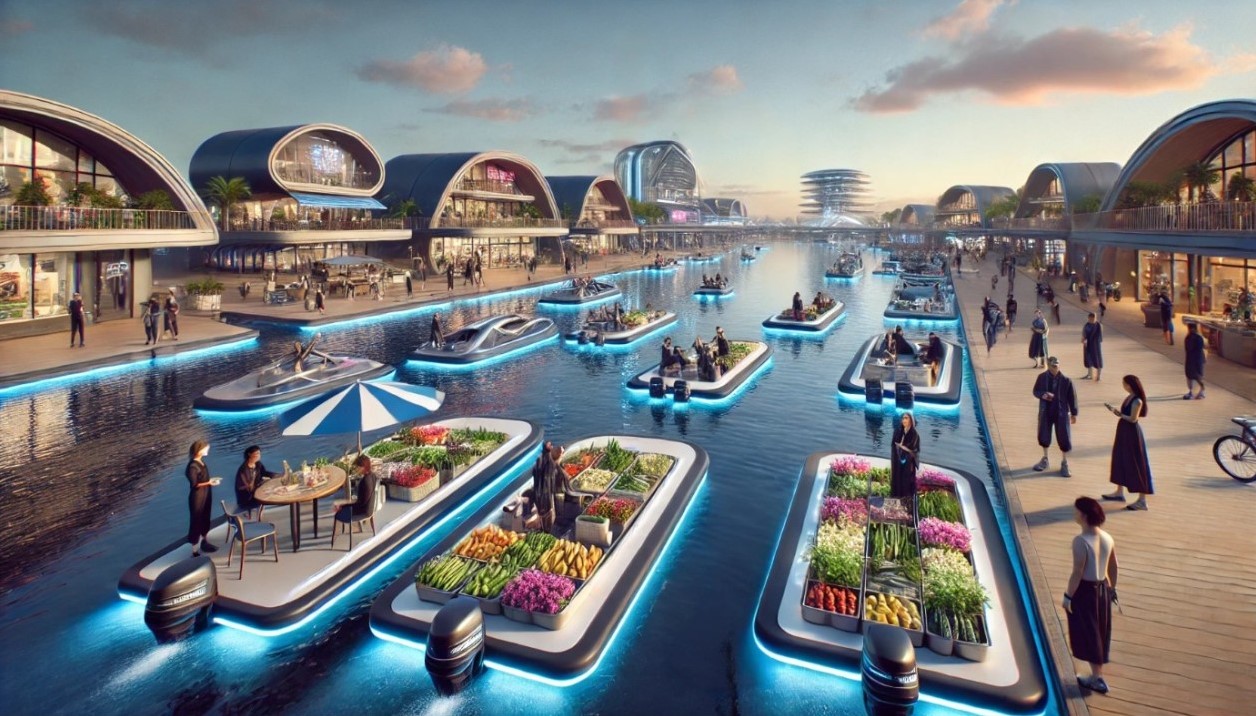As the global population continues to rise and urban areas become increasingly congested, the quest for innovative and sustainable living solutions has never been more critical. One emerging concept that promises to address these challenges is the development of floating cities on oceans and seas.

These off-grid marvels are designed to be self-sufficient, minimizing dependence on external resources. By creating systems for energy independence, water purification, and waste recycling, floating cities can ensure resilience and sustainability, particularly in remote or challenging environments.

Harnessing the Power of Nature
The foundation of any off-grid floating city lies in its ability to generate its own energy. To achieve this, designers leverage a combination of renewable energy sources such as solar, wind, and wave power. Solar panels, strategically placed on rooftops and other surfaces, capture abundant sunlight to provide a steady supply of electricity.

Wind turbines, integrated into the city’s infrastructure, harness ocean breezes to generate additional power. Meanwhile, wave energy converters transform the perpetual motion of the sea into usable energy.

Advanced energy storage systems, such as high-capacity batteries, are essential for balancing supply and demand. These systems store excess energy generated during peak production times and release it when needed, ensuring a consistent and reliable power supply. By embracing a diverse mix of renewable energy sources, floating cities can achieve true energy independence and significantly reduce their carbon footprint.

Water Purification: Turning the Ocean into a Potable Resource
Access to fresh water is a critical concern for any community, especially those situated in marine environments. Floating cities overcome this challenge through innovative water purification technologies that convert seawater into potable water.

Desalination plants, powered by the city’s renewable energy sources, play a pivotal role in this process. These plants utilize reverse osmosis and other advanced filtration methods to remove salt and impurities from seawater, producing clean and safe drinking water.

In addition to desalination, rainwater harvesting systems are implemented to capture and store rainwater. This harvested water undergoes filtration and purification to supplement the city’s water supply. By combining desalination with rainwater harvesting, floating cities can achieve a sustainable and reliable water source, reducing their dependence on external water supplies.

Waste Recycling: Closing the Loop on Resources
Waste management is another crucial aspect of off-grid living. Floating cities employ comprehensive waste recycling systems to minimize environmental impact and promote resource efficiency. Organic waste is processed through composting and anaerobic digestion to produce biogas and nutrient-rich compost, which can be used to support urban agriculture and green spaces within the city.

Recycling facilities handle non-organic waste, such as plastics, metals, and glass. These materials are sorted, processed, and repurposed into new products or construction materials, fostering a circular economy within the city.

By treating waste as a valuable resource, floating cities can reduce landfill use, lower pollution levels, and create a more sustainable living environment.

Resilience and Sustainability: Thriving in Remote and Challenging Environments
The off-grid capabilities of floating cities are particularly important for their resilience and sustainability. In remote or challenging environments, such as isolated oceanic regions or areas prone to natural disasters, self-sufficiency becomes a matter of survival.

By generating their own energy, purifying their own water, and recycling their own waste, floating cities can maintain essential services and continue to thrive even in the face of external disruptions.

Moreover, these cities can serve as models for sustainable living, demonstrating how communities can coexist harmoniously with nature. The lessons learned from the development and operation of off-grid floating cities can be applied to traditional urban areas, inspiring more sustainable and resilient urban design worldwide.

The concept of off-grid floating cities represents a bold and innovative approach to urbanization. By prioritizing self-sufficiency through energy independence, water purification, and waste recycling, these cities offer a sustainable solution to the challenges of modern living. As we look to the future, the development of floating cities could play a crucial role in addressing population growth, resource scarcity, and environmental sustainability, paving the way for a more resilient and harmonious relationship between humanity and the seas.




